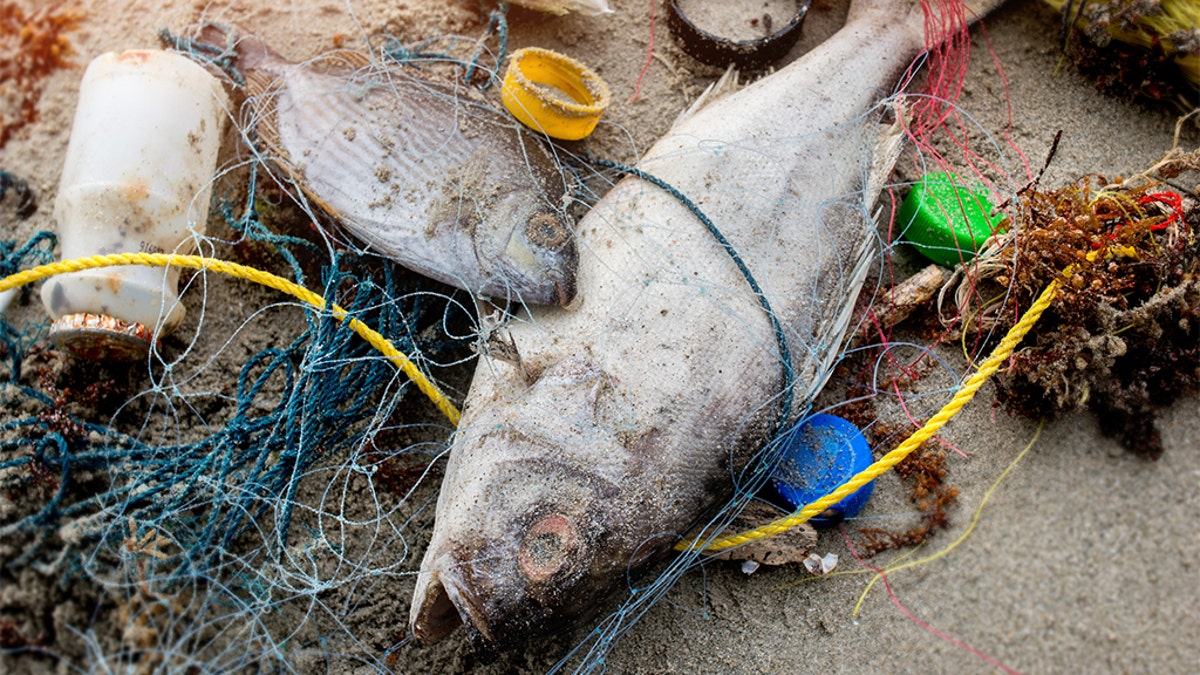Fox News Flash top headlines for Nov. 5
Fox News Flash top headlines for Nov. 5 are here. Check out what's clicking on Foxnews.com
Think of marine plastic pollution, and the image of a sea turtle stuck in a six-pack ring may leap to mind. Or in more recent days, the hotly contested plastic straw. But a new report by Greenpeace UK found that lost and abandoned fishing gear actually accounts for the majority of large plastic pollution in the world's oceans.
More than 640,000 metric tons (think 55,000 double-decker buses) of nets, lines, pots and traps used in commercial fishing are dumped into the sea every year, according to The Guardian.

Death fish on the beach with dirty plastic garbage. (iStock)
In one instance off the coast of Oaxaca, Mexico, last year, about 300 sea turtles were found dead as a result of entanglement in “ghost gear,” the term used to refer to fishing gear that's lost or abandoned in the ocean.
UNITED STATES TO BEGIN PROCESS OF WITHDRAWING FROM PARIS CLIMATE DEAL
Ghost gear is estimated to make up 10 percent of ocean plastic pollution in total but it makes up most of the ocean’s large plastic pollution. One study found that ghost gear made up as much as 70 percent of macroplastic pollution found floating on the surface of the ocean. Both microplastic and macroplastic litter the world’s waters. Macroplastics, like the ghost gear, can be seen with the naked eye. Microplastics include plastic particulates which are already minute in size before entering the ocean as well as secondary microplastics from the breakdown of larger plastics such as soda bottles or plastic bags.
Modern plastics are thought to last up to 600 years in the marine environment, “so the impacts of plastic ingestion and toxicity may persist long after fishing gear loses its form,” according to Greenpeace.
Louissa Casson, an oceans campaigner at Greenpeace UK, said the results say as much about the problem off U.K. shores as they do about the issue worldwide.
OUR UNIVERSE MAY BE A GIANT LOOP, NEW STUDY CONCLUDES
“Ghost gear is a major source of ocean plastic pollution and it affects marine life in the U.K. as much as anywhere else,” she told The Guardian. “The U.K.’s waters do not exist in a vacuum, as oceans have no borders. The world’s governments must take action to protect our global oceans, and hold the under-regulated fishing industry to account for its dangerous waste. This should start with a strong global ocean treaty being agreed at the United Nations next year.”
A recent study found the Great Pacific Garbage Patch, a massive heap of marine debris bound together by ocean currents swirling in the Pacific, comprises 42,000 metric tons of megaplastics, 86 percent of it from fishing nets.
Greenpeace said ghost gear was the result not only of illegal or unreported fishing, but also of overcrowded fisheries.





















